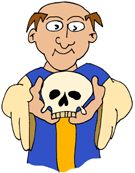|
RBH Home
Maps & Travels
Articles
Legends
Towns & Villages
Castles & Houses
Churches
Biographies
Gentry
Family History
Odds & Ends
For Kids
Teacher's Page
Mail David

|
|

A Bridging Place with Bones and Battles

|
- In Roman times, there were several ‘villas’
or farms in the area that was to became Maidenhead. There was one on
Castle Hill and one at Cox Green. The people who lived there had
luxuries like underfloor heating and steam baths.
- Maidenhead grew up in Saxon times as a
trading post on the River Thames, between Cookham and Bray. A king
called Tappa
was buried on the other side of the River in the 7th century. The area
where the town is was then a small village called South Ellington.
- There was a Royal fort or
'burgh'
at Cookham and an important nunnery too.
The King met his advisors, called the ‘Witan,’ there sometimes.
- The name Maidenhead means ‘Maidens’
Wharf’ as it belonged to the nuns at the nunnery.
- The Vikings invaded England in the 9th
century. They rowed their longships up the Thames and disembarked at
Maidenhead. They then marched across East Berkshire to set up their
headquarters at Reading. They were
eventually beaten in battle by King Alfred.
- In Norman times, a wooden bridge was
built over the Thames here. Maidenhead became even more popular with
merchants because it was easy to get to by both river and road. The
bridge was later rebuilt in stone.
- A hermit lived at one end in Medieval times. He was given 'offerings' of money by people praying for a safe journey. This was used to keep the bridge in good repair.
- In 1269, a chapel was built at the end of
another bridge over the White Brook, nearer the town. The local bishop had not given his permission though and
there were lots of arguments over whether it should be used. The priest there looked after a skull
that was thought to be the head of one of St. Ursula’s companions.
He would show it to pilgrims for a small fee!
- In 1400, there was a big quarrel over who
should be King of England. Henry IV had imprisoned his cousin, Richard
II, but Richard still had lots of friends.
- The Earl of Salisbury, who lived at
Bisham 'Abbey' Manor, tried to murder Henry IV at
Windsor Castle. When he failed, his
friends had a battle with Henry’s soldiers on Maidenhead Bridge. The
Earl visited the Queen at Sonning
and tried to gather support in Reading.
However, he was captured and had his
head chopped off!
- During the War
of the Roses, Sir John Norreys was
an important man at the Royal court. He owned the manor of Ockwells
at Cox Green. He built himself a medieval
hall house there. It is one of the best in the country.
- During the 1630s, there was lots of
fighting between friends of King Charles I and friends of Parliament
in the ‘English Civil War’. Eventually the King lost and was
imprisoned at Caversham Park. Before he had his head chopped off, he
was allowed to meet his children for the last time at the Greyhound
Inn in Maidenhead.
- In the 18th century, Maidenhead became an
important stopping place for coaches on the ‘Bath Road’ from
London to Bath. There were lots of inns and taverns for people to stay
in.
- People especially liked to spend the
night in Maidenhead because they were afraid to cross Maidenhead
Thicket in the dark. Highwaymen used to hide in the bushes there and
would rob the coaches if they could.
|
|



